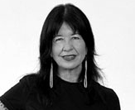
Perhaps the World Ends Here
BY JOY HARJO
The world begins at a kitchen table. No matter what, we must eat to live.
The gifts of earth are brought and prepared, set on the table. So it has been since creation, and it will go on.
We chase chickens or dogs away from it. Babies teethe at the corners. They scrape their knees under it.
It is here that children are given instructions on what it means to be human. We make men at it, we make women.
At this table we gossip, recall enemies and the ghosts of lovers.
Our dreams drink coffee with us as they put their arms around our children. They laugh with us at our poor falling-down selves and as we put ourselves back together once again at the table.
This table has been a house in the rain, an umbrella in the sun.
Wars have begun and ended at this table. It is a place to hide in the shadow of terror. A place to celebrate the terrible victory.
We have given birth on this table, and have prepared our parents for burial here.
At this table we sing with joy, with sorrow. We pray of suffering and remorse. We give thanks.
Perhaps the world will end at the kitchen table, while we are laughing and crying, eating of the last sweet bite.
"Perhaps the World Ends Here" from The Woman Who Fell From the Sky by Joy Harjo. Copyright © 1994 by Joy Harjo.
Black Mesa, New Mexico—as it really appears
Black Mesa, outside of e San Ildefonso Pueblo, New Mexico.
Happy Thanksgiving to All. May Peace Be in Your Heart and Around Your Table this Holiday and ever after
_______________________________________________________________
POET
Joy Harjo (1951 - )
BIOGRAPHY

Joy Harjo was born in 1951 in Tulsa, Oklahoma to Native American and Canadian ancestry. Strongly influenced by her Muskogee Creek heritage, feminist and social concerns, and her background in the arts, Harjo frequently incorporates Native American myths, symbols, and values into her writing. Her poetry tends to emphasize the Southwest landscape and need for remembrance and transcendence. She once commented, “I feel strongly that I have a responsibility to all the sources that I am: to all past and future ancestors, to my home country, to all places that I touch down on and that are myself, to all voices, all women, all of my tribe, all people, all earth, and beyond that to all beginnings and endings. In a strange kind of sense [writing] frees me to believe in myself, to be able to speak, to have voice, because I have to; it is my survival.” Harjo’s work is largely autobiographical, informed by her love of the natural world and her preoccupation with survival and the limitations of language. A critically-acclaimed poet, her many honors include the Josephine Miles Poetry Award, the William Carlos Williams Award, and the American Indian Distinguished Achievement in the Arts Award. She has received fellowships from the Arizona Commission on the Arts, the National Endowment for the Arts and the Witter Bynner Foundation. In addition to writing poetry, Harjo is a noted teacher and saxophonist, performing for many years with her band, Poetic Justice.

No comments:
Post a Comment